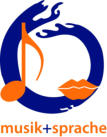musikunterstützte Sprachanbahnung für
chronisch kranke Aphasie-Patienten mit
Wirksamkeitsnachweisen
Publikationen auf Deutsch : Aphasie und verwandte Gebiete, (Schweiz) 2014 Musik und Gesundsein 2014 Neurologie&Rehabilitation, 2011 Aphasie und verwandte Gebiete, (Schweiz) 2010 Neurologie&Rehabilitation, 2006 Neurologie&Rehabilitation, 2004 Lehrbuch 2005-10
Internationale Publikationen:
Journal of Neurology, 2022
CORTEX, 2020
Journal of Speech Pathology & Therapy, 2016
WCNR 2016, Philadelphia, PA
Neural Plasticity, 2014
Aphasie und verwandte Gebiete, (Schweiz) 2014
Music Therapy Advances in Neurodisability 2013
Restorative Neurology and Neuroscience 2012
Aphasie und verwandte Gebiete, Schweiz 2010
NeuroImage, 2009
Music and Medicine, 2009-2
Music and Medicine, 2009-1
HBM 2014 Poster 3734, Hamburg, Germany
HBM 2014 Poster 1530, Hamburg, Germany
HBM 2013, Seattle, WA
HBM 2010, Barcelona, Spain
HBM 2009, San Francisco, CA
Poster GAB 2009
Poster GAB 2006
Buch Kapitel 2005
Publikationen


S I P A R I ®
evidenzbasierte musikunterstützte Sprachanbahnung
für chronisch kranke Aphasie-Patienten

®


Die
von
Frau
Dr.
Jungblut
entwickelte
SIPARI®
Therapie
wird
ausschließlich
von
ihr
oder
von
ihr
ausgebildeten
und
zertifizierten
Therapeuten
angeboten.
Interessenten
und
Patienten
sollten
sich
vergewissern,
dass
der
anbietende
Therapeut
über
eine
entsprechende
Ausbildung verfügt.
Aus Gründen der besseren Lesbarkeit wird auf die gleichzeitige Verwendung der Sprachformen männlich, weiblich und divers (m/w/d) verzichtet. Sämtliche Personenbezeichnungen gelten gleichermaßen für alle Geschlechter.
Jungblut, M. & Aldridge, D. (2004): Musik als Brücke zur Sprache – die musiktherapeutische Behandlungsmethode “SIPARI®“ bei
Langzeitaphasikern. Neurologie & Rehabilitation, 10 (2): 69-78.
Jungblut, M. (2005): Music therapy for people with chronic aphasia: a controlled study. In: Aldridge, D. (Ed.): Music therapy and neurological
rehabilitation. Performing health. Jessica Kingsley Publishers, London and Philadelphia, 189-211.
Jungblut, M. Gerhard, H. & Aldridge, D. (2006): Die Wirkung einer spezifischen musiktherapeutischen Behandlung auf die sprachlichen
Leistungen eines chronisch kranken Globalaphasikers – eine Falldarstellung. Neurologie & Rehabilitation 12 (6), 339-347.
Jungblut, M., Suchanek, M., Gerhard, H. (2009): Long-term recovery from chronic Global aphasia: a case report. Music & Medicine, Vol. 1, No.
1, 61-69.
Jungblut, M. (2009): SIPARI®: a music therapy intervention for patients suffering with chronic, nonfluent aphasia. Music & Medicine, Vol. 1,
No. 2., 102-105 .
Jungblut, M., Huber, W., Pustelniak, M., Schnitker, R., M. (2009): The neural substrates of chanted vowel changes in rhythm sequences.
NeuroImage, 47 (1): S119.
Jungblut, M. (2010): SIPARI® Musikunterstützte Sprachanbahnung bei chronischer Aphasie. Aphasie und verwandte Gebiete, 1, 69-79.
Jungblut, M., Huber, W., Pustelniak, M., Schnitker, R. (2011): Neuronale Korrelate rhythmischer Strukturen beim Singen - eine fMRT-Studie.
Neurologie & Rehabilitation, 17 (1): 33-39.
Jungblut, M., Huber, W., Pustelniak, M. and Schnitker, R. (2012): The impact of rhythm complexity on brain activation during simple singing -
an event-related fMRI study. Restorative Neurology and Neuroscience, 30 (1): 39-53.
Jungblut, M., Huber, W., Mais, C. and Schnitker, R. (2014): Paving the way for speech: Voice-training-induced plasticity in chronic aphasia and
apraxia of speech - three single cases. Neural Plasicity, Article ID 841982, 14 pages, https://dx.doi.org/10.1155/2014/841982.
Jungblut, M. (2014): SIPARI® bei chronischer Aphasie und Sprechapraxie – Was fMRT-Untersuchungen zeigen. Aphasie und verwandte
Gebiete,3, 29-36
Jungblut, M., Huber, W., Schnitker, R. (2016): Rhythm structure influences auditory-motor interaction during anticipatory listening to simple
singing. Journal of Speech Pathology & Therapy, 1: 108. https://dx.doi:10.4172/jspt.1000108.
Jungblut, M., Mais, C. Huber, W., Binkofski, F.C., Schüppen, A. (2020): 5-year course of therapy-induced recovery in chronic non-fluent aphasia -
Three single cases – CORTEX, Vol. 132, pp. 147-165. https://dx.doi.org/10.1016/j.cortex.2020.08.009
Jungblut, M., Mais, C., Binkofski FC, Schüppen, A. (2022): The efficacy of a directed rhythmic-melodic voice training in the treatment of chronic
non-fluent aphasia—Behavioral and imaging results. Journal of Neurology. https://dx.doi.org/10.1007/s00415-022-11163-2


musikunterstützte Sprachanbahnung für chronisch
kranke Aphasie-Patienten mit
Wirksamkeitsnachweisen
Publikationen auf Deutsch : Aphasie und verwandte Gebiete, (Schweiz) 2014 Musik und Gesundsein 2014 Neurologie&Rehabilitation, 2011 Aphasie und verwandte Gebiete, (Schweiz) 2010 Neurologie&Rehabilitation, 2006 Neurologie&Rehabilitation, 2004 Lehrbuch 2005-10
Internationale Publikationen:
Journal of Neurology, 2022
CORTEX, 2020
Journal of Speech Pathology & Therapy, 2016
WCNR 2016, Philadelphia, PA
Neural Plasticity, 2014
Aphasie und verwandte Gebiete, (Schweiz) 2014
Music Therapy Advances in Neurodisability 2013
Restorative Neurology and Neuroscience 2012
Aphasie und verwandte Gebiete, Schweiz 2010
NeuroImage, 2009
Music and Medicine, 2009-2
Music and Medicine, 2009-1
HBM 2014 Poster 3734, Hamburg, Germany
HBM 2014 Poster 1530, Hamburg, Germany
HBM 2013, Seattle, WA
HBM 2010, Barcelona, Spain
HBM 2009, San Francisco, CA
Poster GAB 2009
Poster GAB 2006
Buch Kapitel 2005
Publikationen

2024 © Dr. Jungblut
Impressum
Die
von
Frau
Dr.
Jungblut
entwickelte
SIPARI®
Therapie
wird
ausschließlich
von
ihr
oder
von
ihr
ausgebildeten
und
zertifizierten
Therapeuten
angeboten.
Interessenten
und
Patienten
sollten
sich
vergewissern,
dass
der
anbietende
Therapeut über eine entsprechende Ausbildung verfügt.
Aus Gründen der besseren Lesbarkeit wird auf die gleichzeitige Verwen- dung der Sprachformen männlich, weiblich und divers (m/w/d) verzichtet.
Jungblut, M. & Aldridge, D. (2004): Musik als Brücke zur Sprache – die
musiktherapeutische Behandlungsmethode “SIPARI®“ bei
Langzeitaphasikern. Neurologie & Rehabilitation, 10 (2): 69-78.
Jungblut, M. (2005): Music therapy for people with chronic aphasia: a
controlled study. In: Aldridge, D. (Ed.): Music therapy and neurological
rehabilitation. Performing health. Jessica Kingsley Publishers, London
and Philadelphia, 189-211.
Jungblut, M. Gerhard, H. & Aldridge, D. (2006): Die Wirkung einer spezifischen
musiktherapeutischen Behandlung auf die sprachlichen Leistungen eines
chronisch kranken Globalaphasikers – eine Falldarstellung. Neurologie &
Rehabilitation 12 (6), 339-347.
Jungblut, M., Suchanek, M., Gerhard, H. (2009): Long-term recovery from
chronic Global aphasia: a case report. Music & Medicine, Vol. 1, No. 1, 61-
69.
Jungblut, M. (2009): SIPARI®: a music therapy intervention for patients
suffering with chronic, nonfluent aphasia. Music & Medicine, Vol. 1, No. 2.,
102-105 .
Jungblut, M., Huber, W., Pustelniak, M., Schnitker, R., M. (2009): The neural
substrates of chanted vowel changes in rhythm sequences. NeuroImage,
47 (1): S119.
Jungblut, M. (2010): SIPARI® Musikunterstützte Sprachanbahnung bei
chronischer Aphasie. Aphasie und verwandte Gebiete, 1, 69-79.
Jungblut, M., Huber, W., Pustelniak, M., Schnitker, R. (2011): Neuronale
Korrelate rhythmischer Strukturen beim Singen - eine fMRT-Studie.
Neurologie & Rehabilitation, 17 (1): 33-39.
Jungblut, M., Huber, W., Pustelniak, M. and Schnitker, R. (2012): The impact of
rhythm complexity on brain activation during simple singing - an event-
related fMRI study. Restorative Neurology and Neuroscience, 30 (1): 39-
53.
Jungblut, M., Huber, W., Mais, C. and Schnitker, R. (2014): Paving the way for
speech: Voice-training-induced plasticity in chronic aphasia and apraxia of
speech - three single cases. Neural Plasicity, Article ID 841982, 14 pages,
https://dx.doi.org/10.1155/2014/841982.
Jungblut, M. (2014): SIPARI® bei chronischer Aphasie und Sprechapraxie – Was
fMRT-Untersuchungen zeigen. Aphasie und verwandte Gebiete,3, 29-36
Jungblut, M., Huber, W., Schnitker, R. (2016): Rhythm structure influences
auditory-motor interaction during anticipatory listening to simple singing.
Journal of Speech Pathology & Therapy, 1: 108.
https://dx.doi:10.4172/jspt.1000108.
Jungblut, M., Mais, C. Huber, W., Binkofski, F.C., Schüppen, A. (2020): 5-year
course of therapy-induced recovery in chronic non-fluent aphasia - Three
single cases – CORTEX, Vol. 132, pp. 147-165.
https://dx.doi.org/10.1016/j.cortex.2020.08.009
Jungblut, M., Mais, C., Binkofski FC, Schüppen, A. (2022): The efficacy of a
directed rhythmic-melodic voice training in the treatment of chronic non-
fluent aphasia—Behavioral and imaging results. Journal of Neurology.
https://dx.doi.org/10.1007/s00415-022-11163-2































